|
 Become
a fan on Facebook
Become
a fan on Facebook  Follow
on Twitter Follow
on Twitter
Article by Mark Dujsik | December 22,
2017
Here
are the ten best films of 2017:
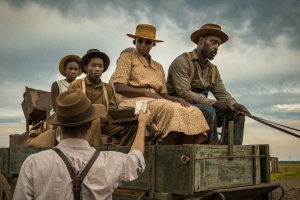 10.
Mudbound 10.
Mudbound
Mudbound
opens with the metaphorical burial of the past and a literal excavation of it.
While burying their racist father, two brothers discover an unmarked grave for
slaves. It may be a brief scene, but it reveals much about the story's
characters and its thematic concerns. The rest of the film uncovers the past of
the characters and the story that led them to this moment. Director Dee Rees and
Virgil Williams' screenplay (based on Hillary Jordan's novel) is vast in its
ambitions, featuring five major characters—living on a farm in rural
Mississippi in the years before, during, and after World War II—whose lives,
motives, and hopes are the central concern. We come to know them through their
actions and a series of internal monologues, which provide a deeper sense of
this place—one of hope, one of despair, or one of still-present prejudice. The
story is most easily defined as melodrama, given its constant conflicts and
ultimately tragic outcome, but that would simplify it too much. The result is a
study of prejudice in all its forms, as well as a large-scale narrative that
never feels as if it's spreading its focus thin.
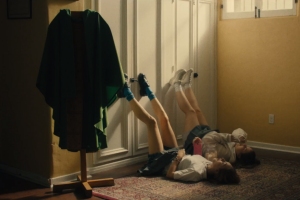 9.
Lady Bird 9.
Lady Bird
It's
the little details that enrich Lady Bird,
writer/director Greta Gerwig's first film on her own in the director's chair. We
assume the film is at least semi-autobiographical, if only because of how
precisely it understands its characters and their relationships. The
relationships are key to the plot. Christine (Saoirse Ronan), who has given
herself the name "Lady Bird," is at odds with her mother Marion
(Laurie Metcalf), is apple of her father Larry's (Tracy Letts) eye, and wavers
on her feelings toward her peers. She's a rebel but in that teenage way—kind
of awkward and coming across as a bit of a jerk every so often. We can
sympathize with her, but Gerwig ensures that we connect to the other characters,
too. Her camera sticks with Lady Bird's parents, for example, after their
daughter's new boyfriend says that Lady Bird told him her family came from
"the wrong side of the tracks." It's all about attention to detail,
from the film's little moments to how seemingly every character here has an
inner life that we can comprehend. The film is an act of love—for this time,
this place, these people, and the pain and joy of being a teenage girl.
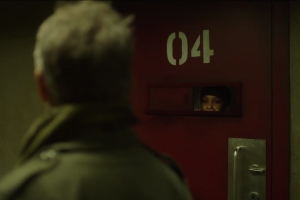 8.
The Girl with All the Gifts 8.
The Girl with All the Gifts
We
don't realize it until the ironic, unexpected, and completely logical finale of The Girl with All the Gifts, but Mike Carey's screenplay (based on
his own novel) is a prime example of great plot structure. Everything falls into
place. Every character has some purpose, in terms of both moving the story
forward and solidifying the story's ultimate point. Even the film's stated
metaphors come to make a sort of twisted sense. In a way, this is a puzzle
story, which begins with mysterious situations and characters, only to give us
an even bigger puzzle—one that has us questioning humanity's role in an
ever-declining world. It's a zombie movie, but Carey and director Colm McCarthy want us to dismiss our
preconceptions. The story focuses on Melanie (newcomer Sennia Nanua, in a great
performance of ambiguity and wisdom), who is a prisoner in a military facility.
From this claustrophobic setting, the film's scope constantly expands. Three
other characters (played by Gemma Arterton, Glenn Close, and Paddy Considine)
have specific roles to play in Melanie's life, and each of them presents a
different way of looking at Melanie. It may be a zombie movie, but it's one that
cares about the ideas those characters state and represent.
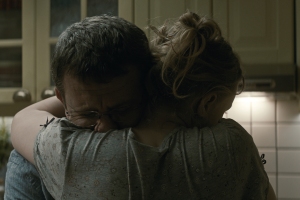 7.
Graduation 7.
Graduation
If
absolute power corrupts absolutely, then surely the possession of just enough
power will corrupt just enough. That seems to be the view of writer/director
Cristian Mungiu's Graduation, a
morality tale about morally compromised people in a place that, itself, seems
morally compromised. It's nothing big. The characters here essentially offer
and/or agree to little favors. These favors aren't offered out of good will,
though. They're all transactions, and everyone recognizes it. Every favor has to
be repaid, either with another favor or cash. These deals are made without
specific words being spoken. Everything is implied. Mungiu watches how all these
favors—all of this corruption—spreads. It doesn't matter that Romeo (Adrian
Titieni) is only trying to help his daughter Eliza (Maria Dragus), who is
assaulted on her way to school one morning. As soon as he makes one deal, he has
started a chain of transactions that, seen from a larger scale, point to a sort
of corruption that is absolute. The film also dissects how Romeo's character is
not as upstanding as he first claims. He lies. He cheats. He has now put his
daughter in the exact position that he wants her to avoid. Is it hypocrisy, or
is it just living a normal life?
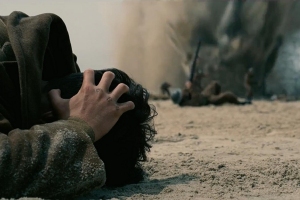 6.
Dunkirk 6.
Dunkirk
With
Dunkirk, Christopher Nolan has made a
film that attempts to communicate the experience of war. The setup is evacuation
of the eponymous city in 1940. Nolan's screenplay sees the operation from the
land—where hundreds of thousands of soldiers are trapped—the sea—where
private boats are racing to rescue those soldiers—and the air—where fighter
planes attempt to hold back German aircraft. We don't meet characters as much as
we see mostly anonymous archetypes, who offer little dialogue and who, in
certain action sequences, might as well be indistinguishable. The central focal
points are the faces of these men—the fear and the determination to
survive—in close-ups and as huddled masses awaiting salvation or doom. Each
section—the land, the sea, and the sky—has its own, isolated timeline and
its own sense of how that time moves forward. It's far from confusing, because
Nolan and editor Lee Smith offer a sort of uniformity, as they intercut similar
images and motifs, while providing a distinct look and momentum for each
segment. Certain events may be happening in different places and at different
times, but they might as well be happening at once. Time may be relative, but
war is a constant.
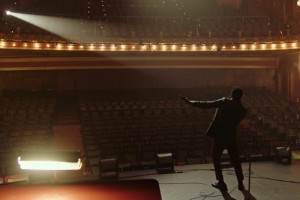 5.
Detroit 5.
Detroit
The
riot, the uprising, or the rebellion began with a police raid on an unlicensed
club on the West Side of Detroit. It was a private party. That's it. The only
thing that seems to bring police attention to the club is the fact that all of
the patrons are black. A protest erupts. Bottles and rocks are thrown in the
direction of the cops. It escalates and would continue for five days. Detroit tells the story of the events in Detroit in 1967 with an eye
toward history, a wide tapestry of the film's present, and an implicit
understanding of how what happened then still happens now. The film comes from
the pairing of director Kathryn Bigelow and screenwriter Mark Boal. It's not a
work of journalism, although it's based on the testimony of people involved.
It's not activism, although the film's outrage about the abuse of power at
various levels is palpable. The majority of the narrative centers on a seemingly
real-time recreation of an "incident" at the Algiers Motel. In less
diplomatic terms, it's the story of how a few cops physically and
psychologically tortured a group of people, while even more cops and military
personnel allowed it and worse to happen. The film is tense, thoughtful, and
uncompromising in its recognition that, while we may learn from the past, we
still seem doomed to repeat it.
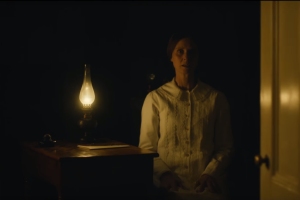 4.
A Quiet Passion 4.
A Quiet Passion
In
the big picture, not much happened in the 55 years of Emily Dickinson's life.
Such a life seems antithetical to the typical requirements of a cinematic
biography. Writer/director Terence Davies is keenly aware of both of these
facts. Hers is a life of great stillness, especially as she becomes older and
more reclusive, and Davies' camera reflects that—remaining mostly still or
moving with barely perceptible subtlety. Since there few milestones in the life
of one of the most important and influential of American poets, Davies'
screenplay is concerned with ideas—about life, success, death, and faith. Most
of the story's conflicts are internal, as Dickinson—played with intelligence,
wit, and emotional honesty by Cynthia Nixon—is wracked with personal and
existential doubts, fears, and insecurities. The film follows Dickinson in a
life devoted to the pursuit of answers to questions that are, rather
contradictorily, both beyond her and completely within control to answer. Her
career as a writer is out of her control, given the times in which she lives,
but the eternal questions are given the most weight by the end of the film. Her
relationship with God, she asserts, is for her and her alone to determine, if
such an entity exists at all. This is a literate and probing biography that
explores the internal and the eternal with equal amounts of insight and
sensitivity.
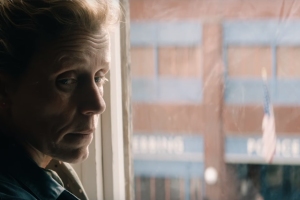 3.
Three Billboards
outside Ebbing, Missouri 3.
Three Billboards
outside Ebbing, Missouri
Here
is a special film from writer/director Martin McDonagh, which taps into the
sense of collective anger that has come to dominate our cultural landscape. Just
about every character in Three Billboards
outside Ebbing, Missouri is angry. They have reasons—some good and some
not. We understand the reasons, though, and in understanding the reasons, we can
sympathize with these characters, even though they may be callous, cruel, and
hardheaded. In this fictional Midwestern town, which seems like a fine place and
a terrible place to live, there's some fuss over some billboards. Mildred
(Frances McDormand, stubborn and intimidating yet thoroughly sympathetic) wants
answers as to why the police haven't made any progress in the rape and murder of
her teenage daughter. The billboards get the attention of the local police
department, led by Chief Willoughby (Woody Harrelson), as well as the news and
the rest of town, who are divided about Mildred's actions. On the less
sympathetic side, we get Dixon (Sam Rockwell, in a daring, high-wire act of a
performance), a patrol cop with accusations of race-based torture against him.
Despite their obvious flaws, there is good in these people, and as trying and
questionable as the search may seem, McDonagh wants to find that good. The film
is quaint enough in its setting, quirky enough in its characterizations, and
broad enough in its aims to serve as a parable about decency and forgiveness.
Beyond that, it's an empathetic view of humanity at its best, its worst, and
everything in between.
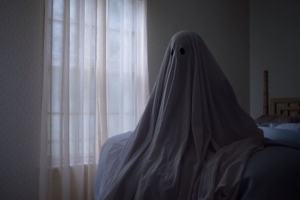 2.
A Ghost Story 2.
A Ghost Story
Writer/director
David Lowery demands significant patience with A
Ghost Story. One will figure that out before two shots in which a character
eats a pie for five uninterrupted minutes, but there's a good reason for
offering the film the required patience. It's the story of a ghost that haunts
the house it lived in while it was alive. The ghost is represented by Casey
Affleck wearing a bed sheet with holes cut out for eyes—akin to a child's
Halloween costume. There's nothing human about the figure—no shape, no ability
to display anything but broad motions, no way to determine if it feels anything.
It's a mirror, really, for how we feel about this particular situation—a
lonely, wordless existence, doomed to watch as life goes on even after one's
death. Rooney Mara plays the formerly living man's wife, and other characters,
including a philosopher who helpfully gives us some grounding in the film's
intentions, come and go. It's an existentially terrifying vision of an
afterlife.
Beyond
that, though, it's also a film about time. Lowery gives us long takes of nothing
happening, and it's clear that we're supposed to filling in the blanks with our
own thoughts—not about what's happening on screen but how we feel about these
passages of time. The film's pacing hastens as the story progresses, with a look
into the future and how the definition of the ghost's house changes, and
regresses, with a look at how lives lived long ago have been long forgotten.
It's a boldly, unapologetically different and challenging film, demanding
thorough and, at times, frightening introspection on the nature of existence.
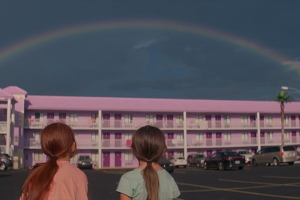 1.
The Florida Project 1.
The Florida Project
Out
of a despairing situation, Sean Baker has made a surprisingly joyous film. The
best film of 2017 shows a complete understanding of how children will play
through, in, and with almost everything and just about anyone. The
Florida Project is set in Orlando, Florida, where the streets are named
after fairy tale characters. Outside of city's vacation-spot veneer, there is a
series of hotels that fall outside the radar of tourists looking to enjoy the
assorted and massive theme parks. In these places, people of the lower
socioeconomic class, living in poverty and with uncertainty on the fringes of
society, find rooms to call home at affordable monthly rates.
The
main character is Moonee (newcomer Brooklynn Prince, a revelation), a young and
precocious girl who spends her summer days with friends, looking for adventures
and ice cream. Her mother Halley (Bria Vinaite) is between jobs. The hotel's
manager Bobby (Willem Dafoe, gradually revealing how much of a protector he is
for these kids) runs a tight operation. While Moonee and her friends go on their
expeditions, Halley scrambles and hustles to pay the rent.
The
story is objectively depressing, but Baker is working from a subjective
perspective. It's all told from Moonee's point of view, but even with this
inherent innocence, Baker and co-screenwriter Chris Bergoch don't sugarcoat
what's happening. The exception is the divisive final sequence, which goes
against the story's logic but comes as an almost necessary relief. It's as if
Baker, who has such empathy for these characters, doesn't want the weight of
reality to crush them. We know it's false, but we also feel grateful for that
small, final act of kindness.
Honorable Mention:
Baby
Driver,
City of Ghosts, Coco, Human Flow, The LEGO Batman Movie,
Logan, The Lovers, Lucky,
Personal
Shopper, Phantom Thread, Risk,
The Shape of Water, Star
Wars: Episode VIII – The Last Jedi, Trophy, War for the Planet of the Apes, Wonderstruck
Copyright © 2017 by Mark Dujsik. All
rights reserved.
 Back
to Home Back
to Home
|
Buy Related Products

|
